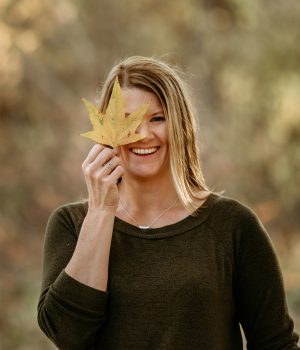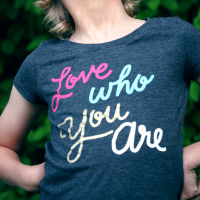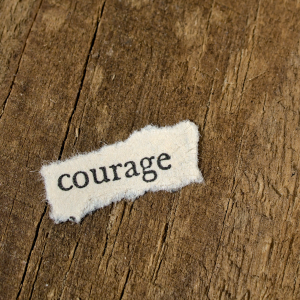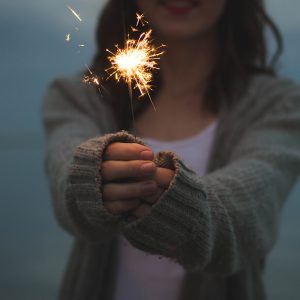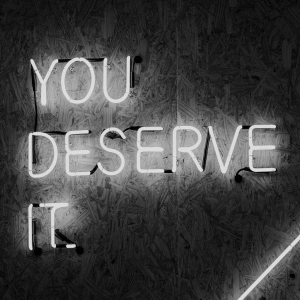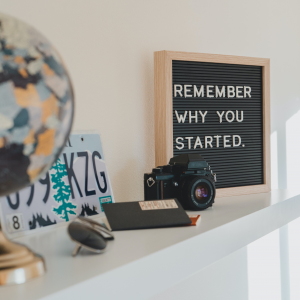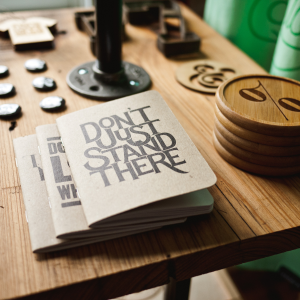Episode 79: Join me for this incredible conversation with my colleague Ann Becks about being unapologetically yourself and how showing up that way will change your life.
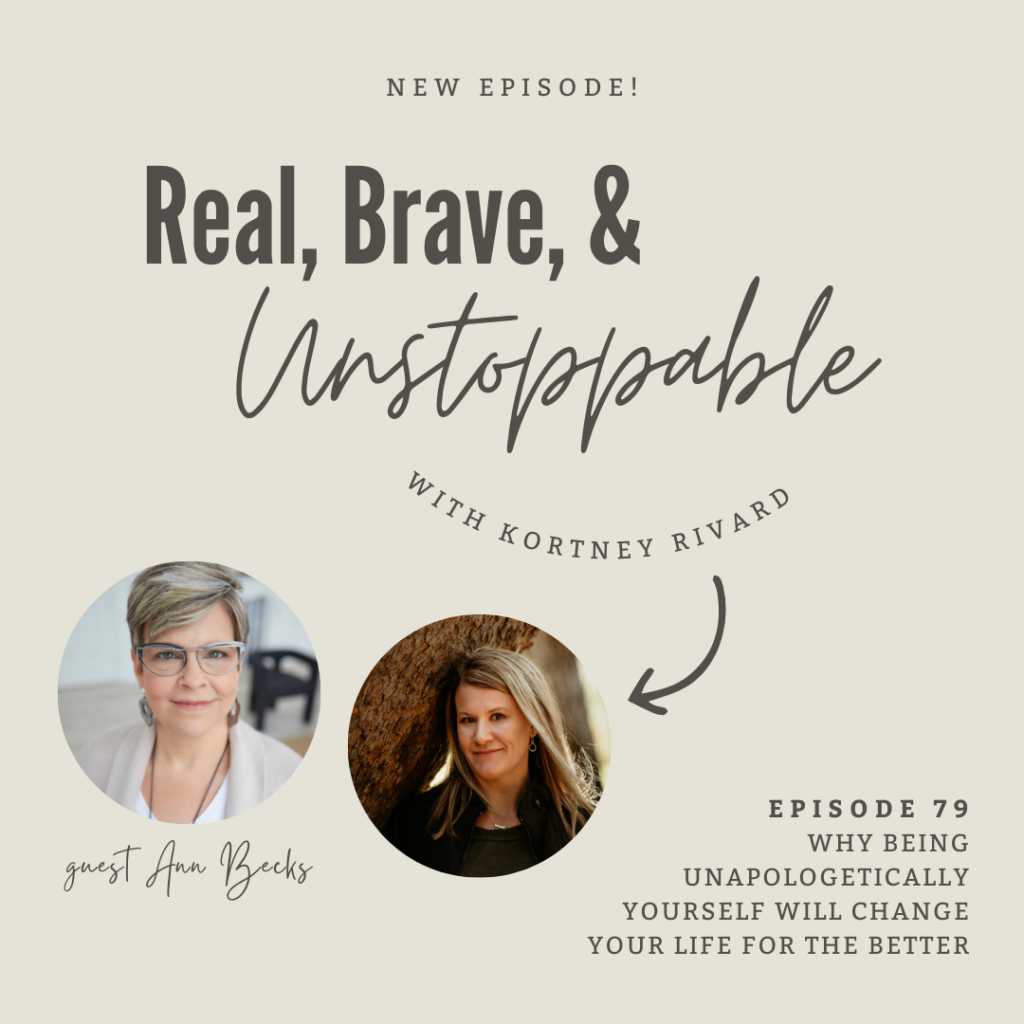



Prefer to read an article? Visit kortneyrivard.com/how-to-bounce-back-from-divorce-or-breakup
Show Notes:
Join me for this incredible conversation with my colleague Ann Becks about being unapologetically yourself and how showing up that way will change your life.
We’re giving you a sneak peek into our upcoming FREE online summit, UNAPOLOGETICALLY YOU: A 1-Day Event for Women, where you’ll learn to stop settling and living the life you REALLY want to live.
On Thursday, March 31st, 8 experts in their fields of passion will join us to talk about what it means to show up unapologetically YOU in all different areas, why it matters and how it will change your life.
Please join us! Register HERE.
About Ann Becks
Ann traded in her scrubs and prescription pad to mentor and guide other professionals who have achieved career success, but who feel exhausted, stressed, and unfulfilled in other aspects of their lives. Through her signature program Mud to Lotus™, they get to the heart of the problem and begin creating the life they really love.
You can learn more about Ann at www.annbecks.co
Do you want to learn how I can help you unapologetically claim the life that’s waiting for you? Let’s talk!
Schedule a call at www.kortneyrivard.com/lets-talk
Thanks for tuning in! Visit https://www.kortneyrivard.com/lovelife to download a free guide on how to create a life you love!
Support the show (https://www.buymeacoffee.com/kortneyrivard)
You may also like:
The Real, Brave, & Unstoppable Episode catalog
Transcript:
Episode 79: How Being Unapologetically Yourself Will Change Your Life for the Better
Ann Becks Podcast
Kortney: [00:00:00] Hello everyone. And welcome back to Real, Brave, and Unstoppable. This is episode number 79.
Kortney: I have a special treat today. I have a colleague of mine, Ann Becks with me! Ann and I are in a certification program together and we both share a common thread through our work. We’ll talk about that in a minute, but Ann and I are hosting an online summit at the end of the month.
For those of you that don’t know what a summit is, it’s an event where we collect a bunch of different speakers and we provide an awesome day of content for you with information and resources that you can take away to help improve your own life.
Kortney: Our summit is called Unapologetically You: stop settling and start living the life that you really want. The summit is going to cover everything from money to relationships, to choosing a career that’s authentic for you, to dealing with stress and overwhelm and so much more.
[00:01:00] We’re super excited to bring this to you and share what being unapologetically yourself means to us and our speakers, but the idea behind it is that Ann and I have both really learned in our lives that when you go through your life and you’re always trying to be someone who you think you “should” be, you end up feeling stuck like you’re going through the motions.
Kortney: For example, you may have an idea of what success means to you based on what other people have told you success means. And that might be that you make a lot of money, but maybe your authentic self doesn’t really care about that so much. So, it’s a matter of what would be possible for you if you were to let go of that and show up in your life with your own definition of what wealth means to you.
You’ll feel so much better about where you are, and you’re really empowering yourself to create and live your life rather than just exist within it.
Kortney: That’s an example of one of the speakers we’ll have. We’ll talk a little bit more about the different topics and how this applies to other areas of your life, and we’ll also tell you how to register, but right now, it’s my pleasure to introduce Ann Becks. Ann, welcome to the show. Thank you for being here.
Ann: Oh, Kortney. I’m so happy to join you here.
Ann: This is amazing. And I’m so happy to be collaborating on this summit with you. We, as you’ve said, we have so many similar threads through the work that we do. And I think all the speakers that will be joining us in this summit are amazing. They are all experts in
Ann: their areas of passion but underpinning their big why really connects to this being Unapologetically Yourself – [00:03:00] them, me, us, you. And so I think it’s really beautiful that, inside of the container, in which we’re you know, sort of students,
Ann: that we actually can share from our own experience this thread and share it with so many beautiful other experts and people who participate.
Kortney: I couldn’t have said it better! It’s really amazing that we were able to come together and since we do have this kind of common thread again, we’ll talk about that in a minute, but we do have an amazing lineup of speakers. So Ann, why don’t you tell everyone a little bit about you and what you do.
Ann: Sure. So, I gave up, my scrubs and prescription pad as a nurse practitioner a few years ago and exchanged them for coaching. I coached [00:04:00] high achieving professionals – sort of a version of me Kortney a few years ago – that has achieved quite a measure of career success, but what they struggle with is that the busy-ness of the work that they do leaves them feeling exhausted, stressed, sometimes on the edge of burnout and really feeling unfulfilled in some other areas of their lives.
Ann: For example, relationships that have become sort of disconnected. They don’t feel really nourishing. And have lost their spark. Whether that partnership is an intimate partner or whether that is colleagues or friends or family, often relationships feel a bit messy. So much of what my clients come to me with are they feel exhausted.
Ann: They feel like they’ve been running on a hamster wheel day in and day out. And they can’t really even enjoy the success of their career because they’re doing so many [00:05:00] things that feel like they don’t really matter to them. They feel stressed, and in many ways, they feel like they almost stumble on by accident, fun, and real happiness. There’s this sort of vague sort of emptiness that they keep looking for something else that’s sort of the key to having the life that they thought they were creating. And yet here they are with this beautifully successful career, which most times they love, but, but it’s just taking so much of their time.
Ann: My work for 30 years as a nurse practitioner my specialties were held in critical care and palliative care medicine. And so much of my journey was lived really driven in my career, which I loved and learned beautiful things in and [00:06:00] contributed to so many people’s experiences of both life and death.
Ann: But I also lived my personal life in that way. I lived my life running races, road races, injured. You know, over-trained, my entire life was spent this way. And then I was constantly searching, well,
Ann: how the heck do I make this? This feels so hard. I’m exhausted. I don’t think I can keep doing this pace anymore.
Ann: I did all kinds of trainings, like yoga teacher training, meditation teacher training on and on and on. I did all the things, and it wasn’t until I had a couple of experiences inside of my career, one being an episode of workplace trauma, that sort of just took me to my knees and I realized, gosh, I need to do something different here.
Ann: It just literally knocked me to my needs. And the second time [00:07:00] was where I started feeling really burnt out. I could feel myself dreading my work. Not the patients, not the families. I mean, I, I totally loved them. But I could feel myself dreading it. And so it was at that point that, you know, again, on my knees, I was like, gosh, I really need to get clear about what, what is actually driving the bus here? What is my life, why do I keep doing this over and over and over again? And I keep hoping for something different, which I think is a cool experience, right? We try things where we’re oriented towards
Ann: you know, finding the problem and then fixing it. And so my experience I know, is not unique because of the clients that I serve.
Ann: They come to me with the same sorts of things. That’s sort of more robust version of [00:08:00] who I am and what I do. And my passion really is to have professional people, high achieving professional people to really find and live the life that they really want to live, that is good. It’s really good.
Kortney: That’s beautiful. Thanks for sharing that. I think that so many of the things that you help clients within your unique niche are really the same thing that I help clients within my unique niche. And it’s, it’s interesting because I feel like those problems are so common for people of all different walks of life.
Kortney: Getting burned out and stressed because they’re doing things that don’t necessarily mean anything to them. Yet, there’s something, some kind of conditioning that said to them, this is important. And so many of us live by the way you “should” do something.
Kortney: And that’s where yes, you get burnt out. You get on the hamster wheel, you feel stuck. And then you feel kind of lost. Like where do I start to even change? How do I make a change? How do I find happiness? I personally like the name of our summit… Ann and I spent so much time brainstorming this and asking other people, what should we call this?
Kortney: And after some iterations, we came up with Unapologetically You and I just am loving that name so much.
Ann: I agree.
Kortney: Ann, tell me a little bit, so tell me what you, what that means to you. What does Unapologetically You mean to you?
Ann: You know, Kortney, as I have been doing interviews with our speakers for the summit, it’s not just you and I, that love this language of Unapologetically You. Everybody’s like, oh my gosh, I love that. So, what it means [00:10:00] to me, and I think the core of what I learned over the course of my 30 years in healthcare as a healthcare leader
Ann: and now in my own personal journey, is that when I choose to be me, when I claim all of me, claim the voice, my voice, my opinions, my thoughts, when I claim all of this without apology, without making excuses or having to explain, but I actually just choose to live the life that was gifted to me,
Ann: It shifts everything in my world. It’s like cleaning the glasses, you know, the glasses that I physically wear, right. It’s like cleaning the dirt and the mud off them that life has layered over time [00:11:00] and choosing me so fiercely that the courage it takes to step outside of the conditioning that you talked about, right?
Ann: If we cleaned that all off and we go, actually, it’s as scary as heck, but here’s the thing. Here’s what I know is true for me: It situates us when we do that in such a solid grounding, a solid claiming of me and of the life that’s been given to me, that uniqueness, the unique expression of life through Ann, the unique expression of life through Kortney, through each of our speakers, through our participants, through each of your podcast listeners. What is life asking [00:12:00] you? And when we claim that, when we just say, actually, this is me, it’s how we show up in the world. It changes what we say yes to and what we say no to. And that is how the trajectory of our life starts to follow this authentic self. This me, that life is saying, Hey, you got one live into it. This is I’m giving it to you. Why not choose it? It’s an invitation that stands every single morning. When we open our eyes to choose me, what does this mean? This unique expression of Ann this morning?.
Ann: And I think as you alluded to earlier, Kortney, when we do that and we claim this, we own our sovereignty as a human and automatically, we honor the others in our lives, whether it’s people we know or whether it’s people more distant, et cetera. And that has many ripple effects, which I think we’ll probably chat about.
Kortney: Yeah, totally. I love the way you described it as an invitation. Every morning we have an invitation to be more of who we’re meant to be. I really believe – there’s so much talk about finding your purpose. And I think that what I’ve learned is that for a lot of my life, I tried to find my purpose outside of me and something always felt like it was missing.
Kortney: And when I finally realized that really each of our purposes is really here to be who we were called to be who we were put here to be. And so instead of looking outside, I’ve learned, it’s really about coming home to yourself, coming home to your heart, because that is where you’re going to find your purpose.
Kortney: There’s nothing outside of you that will ever make you happy if you can’t first come home to that. And what I’ve found too is I’m going to use an example of a relationship that I’ve recently ended. For a long time, I’ve felt like I’ve had that mentality of I’m me and I’m not going to change me to make this relationship work.
Kortney: And I’ve sort of felt like the other person feels the same way. Like if this isn’t working for you, it’s not a problem. [00:15:00] You’re not wrong. I’m not wrong. We’re both just who we are. But I think when you do claim that you’re able to live in that space of taking things as they come and then deciding for you
Kortney: what’s right, it doesn’t make the other person wrong. And we talked about that the other day – that it really then becomes not about what’s outside of you. It becomes about, you know, what is authentic for you in everything,
Ann: Yeah.
Kortney: And that includes how you respond to something and what’s true for you.
Ann: Absolutely. And in many ways, I would even go as far to say, as our purpose is actually to live life. That’s been given to us as an expression of life. That is our purpose. Your purpose is unique to you.
Ann: But the purpose really is what is my right next thing as an expression of an in the world. What is this [00:16:00] thing today?
Ann: In this moment, when I opened my eyes this morning, what does that look like? What does my body want to eat? What does my body, how does it want to move this morning?
Ann: What is the, you know, the next thing that I want to do, I would say that that is sort of, that is our purpose is to live into this uniqueness that we are, but we have to know.
Ann: We have to become familiar. And I would say reconnect with, because, you know, we don’t lose this part of us. It’s not gone or broken or anything. It’s just that it’s gotten so covered over with all of the conditioned experiences, defenses that we build over time to avoid being hurt. It’s layered over. And so it’s really a reconnecting or a rediscovery of like, oh, this is me. And how does this me [00:17:00] underneath all of this, you know, limiting beliefs and stories and thoughts, how does this me want to live into the world? And that’s where this deep sense of connectedness, of happiness, of ease, of contentment, of fulfillment, arises because now I’m living completely aligned, not through the dirty lenses.
Ann: The “shoulds” and the musts and the rules. Now it’s like life wants me to live into it.
Kortney: I love the analogy that you’re using with the glasses, like wiping the glasses off. That’s so good. What came up for me as you were talking about all this conditioning we have is the analogy of the castle that is in Debbie Ford’s book, Dark Side of the Light Chasers.
Kortney: She actually took that from another book, but, basically, when we’re little, we have this big castle that has all these beautiful rooms and we love all of them [00:18:00] the same, whether or not they’re a tiny little closet, a basement, or a huge grand room.
Kortney: We love all of them the same and to us, they’re all perfect. And then somebody comes over and says, oh, you know that room is not so good. You might want to lock that one away if you want a perfect castle. We start locking different doors and pretty soon we just only have a little bit of a castle left.
Kortney: And that’s really what it’s like when you grow up and fog the glasses up, you know, it’s like you cover up so many of the gifts that you have in so many parts of who you are and that’s everybody, everybody does that. It happens to everyone.
Ann: I know. Right. Well, and, and I, I love analogies because I think different analogies speak differently to different people. Right. You know? What, what has meaning for me might not have that same meaning. So I think it’s beautiful to use these different analogies. You know, you talked about coming home to ourselves and I think that is such a beautiful [00:19:00] reflection.
Ann: I mean, when we think about home, there’s something of ease. There’s something of peace of, of calm of safety when we’re at home.
Ann: And that really is what it’s like to claim ourselves so unapologetically. It doesn’t mean that we don’t experience life, that there isn’t grief or sadness or fear or shame.
Ann: Those things are all part of life. We’re not trying to bypass those things, but it’s the anchor, the groundedness of home of, yes, I am still me experiencing grief. I am still me experiencing anger, shame, fear. And when I fiercely unapologetically choose me, I can take a step forward in the direction [00:20:00] of my own growth of my own love, because it’s just what life was calling me to.
Ann: Is there the fear story here? Of course, because that is, we’re hard-wired that way, but the thing is we can see it. We don’t become it and we choose to move through it with courage. I mean, courage is required in the face of fear, right? To say, okay, actually I’ve done this over and over and over and over.
Ann: I mean, all of us know of the patterns we have in our lives that we repeat over and over and over. And I mean, when we actually stop to think about it, we think, oh my gosh, it’s sort of the definition of insanity, right? I’m going to keep doing this thing, hoping that it will be something different. And the beautiful thing is, is in order to, in order to actually move in the direction of our heart’s desire of our unapologetic self, [00:21:00] fear is going to come up.
Ann: We should expect it. We should know that that’s going to come up. And that doesn’t mean anything’s wrong. Cause often when fear shows up, it tells our interpretations there’s something wrong here and we should stop. But what we have to do is have a relationship with this fear and go, oh, oh, you’re pointing me towards something. No
Ann: problem. And when I’m grounded, as me, as myself, then fear is just a part of my experience. And I can step forward with the courage That’s needed because I’m so solid in this claiming of this is what feels like the right next step for me.
Kortney: That’s such a great point because, you know, fear, the way that we react to fear is exactly what we were talking about before. It’s conditioning and there are patterns, you know? When you do come home to yourself, you are able to see that for what [00:22:00] it is and you’re right,
Kortney: it’s having a relationship with fear and courage too. The other thing that came up for me as you were talking is, you know, there’s a lot of self-love involved in coming home to yourself – being unapologetically yourself. And one of the things that I’ve worked with my own coach a lot on is loving all the parts of you, even the part that is afraid, or even the part that sometimes does want to please other people.
Kortney: And because your brain is always going to want to revert to being critical of those parts because it’s a safety mechanism and it takes a long time to form those new neural pathways that say I don’t need to go there anymore. There’s a lot of like compassion and self-love involved in living this way, which is, I think really important to, to note for people.
Ann: I couldn’t agree more. And I think, I think my own experience with this and what I see happen with my [00:23:00] clients is, as we meet fear, as we meet some of these parts of the castle rooms, you talked about, we closed the doors on that’s a defensive strategy to close the doors, it’s to reduce pain and wounds and right.
Ann: It’s about safety sometimes. When we start to have a relationship with when we start to look at these doors that we’ve closed, when we start to meet ourselves in these places and we follow the thread of, wow, this is a belief that I had about myself. One of the beliefs that were really core for me was I’m broken and can’t be fixed. And I’m sure anybody who hears that statement if you are really quiet in this moment, you’ll feel the grief that’s underneath that. The grief of like, oh my gosh, what I think to believe about [00:24:00] oneself. But when I move through that grief and I, what, what comes forward without me making it happen is compassion is love.
Ann: Like, oh my gosh, here’s a belief that I held about myself. I have seen this replicated over and over in my clients of meeting themselves. And what emerges is love. We have to claim all of us. It’s all parts of us. It’s just that this me-ness underneath is, is the core of who we are. These other experiences are parts of what I would call your personality, your ego structures.
Ann: But personhood, this me underneath is the thing that doesn’t change. The things that change or the personality ego structures that develop over time. And there are core stories and beliefs that we have, but at this [00:25:00] relationship with them and when we meet them, what emerges is his love, is compassion. And I think it’s also what keeps us relating to others. In a way that’s humble because we also see the parts of us that can be mean. We can see the parts of us that can be ashamed. We see the parts of us that are scared when we claim all of us, it gives us access to compassion and recognizing the sovereignty of others.
Kortney: Yeah, absolutely. As you say that too it kind of makes me think about what’s going on in the world right now in Ukraine, how, you know, we see these people that are just completely egomaniacs, really, that are wanting to claim something that really is not theirs.
Kortney: And I don’t want to [00:26:00] talk about politics, but it makes me think, at the root of things, we are love. And so, as you were talking, I was thinking, what if everyone were to recognize this? And what if everyone were to realize, oh, for me to really live a full life, all I need to do is come back to myself and then I’ll just I’ll feel love.
Kortney: And I’ll always be able to come back to that. Like, how would things be different?
Ann: Yeah, Kortney you and I can talk for a long time together and we have chatted about this, but I love, love, love that this is part of our conversation. You know, this war in Ukraine, on Ukraine, is really it’s reflective of exactly these ego-personality layers that I was talking about. It’s the result of living through that lens of ego and personality right there. That there’s a me and there’s an other, [00:27:00] and this other is somehow wrong.
Ann: And in Kortney, it applies to so many things that we have seen in the past number of years. I mean, from this war, this world event, and then we can bring it down into our individual countries. Race, religion. There are all these other things where we are at war with an other that doesn’t look like me.
Ann: Doesn’t believe like me. Doesn’t talk like. Doesn’t practice their religion like me. And it’s this other-ring that, if we claimed our seat, all of us, if every person in the world claimed themselves the essence of who they are and lived into it unapologetically, it would [00:28:00] be impossible to hate another.
Ann: It would be impossible to go to war because we see ourselves the love, the essence is, as you said, right? The essence that I feel we are, which is, which is love.
Kortney: I’ve been reading a lot of Eckart Tolle lately. And you know, he talks a lot about the ego and how it’s afraid of dying. It’s afraid. And it’s always wanting to protect its identity, which is really a false self. We talked about the conditioning that we accumulate over time and that’s our ego. It’s the false self that we’ve created to keep us “safe”.
Kortney: So I look at what’s going on in the world and you know, of course, we see so much ego, but [00:29:00] really it comes out of fear. The ego is afraid. If it doesn’t assert itself, you know, and it thinks it’s going to die. If you think about it that way, you can really see how, when we’re in our minds all the time and we’re listening to that ego, oh my gosh, you, you must do this.
Kortney: Or, you know, you’re not going to be good enough or you’re going to lose this or, you know, those sorts of things, you can see how things get to be the way they are.
Ann: Absolutely. Absolutely. So I think that’s the beauty of that is the beauty of choosing me unapologetically is I can see that
Ann: I believe that every person at their core was born with this essence of life, of love. And over time, this false sense has sort of asserted itself, and so [00:30:00] insidiously,
Ann: and sort of unconsciously, that it’s driving the bus. When how much more imperative is it
Ann: now in this moment for each of us to really claim ourselves, to choose me. And I think that can take some support and guidance. I mean, I think that’s what I provide for my clients.
Ann: What you provide for your clients, is this support and guidance to say, coming back to me, what is that? Even who am I really? And then claiming it, you know, fiercely choosing it unapologetically. It allows me to see, oh, because I also see my ability to hate, I see my ability to create another to judge, to whatever.
Ann: And when I claim this as all part of. As I said earlier, this sort of sovereignty of, okay, I’m claiming me, but it isn’t through the lens of ego [00:31:00] that I view another it’s with all of me here saying Yeah,
Ann: and I see you too. I know my ability to hate, I know how I can go there. And yet when I choose to live from myself from my truth, from my essence, it is this humble one step forward.
Ann: And I relate to the other as a sovereign being. There can be no war in that space. All it is is curiosity. Wow. That’s different. I don’t think that way. That’s not my opinion, but I don’t have to make you wrong, but I neither do. I make myself.
Kortney: That’s exactly what I was thinking when you were talking before, is you don’t have to agree with someone, but you do honor the other person’s sovereignty to be able to have their own opinions, and I think the tricky part becomes where, you know, not all of us are in [00:32:00] the same awareness – some people exclusively live in the ego and they just have no awareness of something different.
Kortney: The tricky part is that it’s a movement. And so many more people all the time are recognizing this, that I don’t want to live like that, but then we still have the people that are, and so it’s like a balance of that’s different. That’s not how I want to live, but I honor those people too.
Kortney: They’re not wrong. It’s just how they’re choosing to live. I’m not wrong either.
Ann: Yeah. And, and I think you know, we started out, you know when you asked me this question about, you know, or, or brought up these issues sort of world issues. I mean, it isn’t that that war is right. It isn’t like, oh, okay. We have a different opinion on war. No, what we started out by saying what you said was, what, if we all there would be no war if we [00:33:00] all claimed ourselves, but we’ve not all claimed that but what you and I, you know, are co-hosting is actually wanting to share this message more widely about what if we took another step in the direction of our own selves and claiming the life that has been given to me and living that expression into the. is so beautiful, this contribution of a unique being into the world, the art that flows from that, the music that flows from that,
Kortney: Absolutely.
Ann: that flows from that, the business that flows from that right, is, is a unique expression of being in the world. That is, that is why we’re holding this summit.
Ann: And it’s so timely given the events that are happening and this [00:34:00] seeing how we can war with each other. And I would even say our own experiences inside of our own countries, but right down into where I am at war with myself, because what points me in the direction that I’m actually not living as myself. Not claiming myself.
Ann: is suffering – when I find myself saying, oh, I don’t like this. Why is this? I don’t like this. That’s the key. That’s the cue. That’s the flag that says, whoa, you are not actually living you.
Kortney: So good. I was thinking earlier is and I’ve kind of experienced this recently too, is that you know, when you are going down this road of being committed to living unapologetically yourself, it’s not easy because you are always being faced with hard decisions. It’s sometimes easier to go along with the crowd. Or [00:35:00] like, for example, in this relationship, it was a lot easier for me to just kind of go along with the status quo, than break up a five-year relationship.
Kortney: I got a lot of coaching on it and eventually I was like, okay, well, if I stay here and just kind of, you know, exist and it’s fine, I’m not really being true to myself. That’s where we get stuck. It’s a comfort zone. And for us to really align with our purpose you have to make those hard decisions.
Kortney: I think that that’s why so many aren’t all on the same page that way. Because it’s hard to make those choices. And so when you become committed to living in alignment with who you really are, it’s not easy. It’s hard work. It’s not for the faint of heart.
Kortney: We say this in our circles a lot. This work is not for the faint of heart, but it’s the way that you live to the fullest. When you hear people talking about being on the [00:36:00] hamster wheel or feeling stuck, the way to get off of the hamster wheel is to do this work. Even though it’s hard. You’re going to experience low lows and high highs, but the highs are going to be so much higher and better than if you just lived on the even keel where everything was flat. You can’t numb out just the bad stuff.
Kortney: It numbs the good stuff too. So yeah, when you say being at war with yourself, that’s kind of what comes to mind for me is when you’re not living your truth, you’re really at war with who you really are. And once you can make some peace with that. I know for me, like body image for a long time was, was a big thing for me and I was at war with myself, my body. I hated my body and I would say the nastiest stuff to my body.
Kortney: And that’s not living in truth. That’s not, you know, living in my gifts and really appreciating the life that I’ve [00:37:00] been given. So, you know, that’s another example of where sometimes it’s easier to just beat up on yourself than accept especially when the body is involved. I talked to a lot of women who would rather lose weight, or work on losing weight than just accept their body because they’re afraid that if they just accept, they’re letting themselves go.
Kortney: And that’s not living in your truth either. You need to love all the parts. And that is hard sometimes.
Ann: Oh my gosh. I love, I really love that, Kortney. I think that that is the truth of it. Living unapologetically yourself does not excuse us from the hard stuff. In fact, stepping outside of what’s familiar, what’s comfortable keeps us circling in sort of survival strategies when our heart is actually wanting to thrive. It wants to – that’s the longing that we feel to [00:38:00] say, actually, what I really want is, and when you feel that that’s this heart longing, that is like, actually, this is, this is me that really wants the ease of a beautiful relationship where we can chat and still be our own people, but chat and have this beautiful connection.
Ann: That’s this longing, but it’s unfamiliar to step outside of the structures of familiarity that we’ve built that are safety structures, survival structures. And when we take a step in that direction, fear is what flies up. It’s a, it’s a protective strategy. It’s neurobiologically hardwired for all of us. And so I love that. You sad about yes, it feels it could feel safer just to stay, but then there’s this longing for something [00:39:00] more, something different to follow that we actually have to step outside of our comfort zone, which inevitably means that we feel the discomfort of the stuff we’ve relegated behind the locked doors.
Kortney: Absolutely. Yes, yes, yes. A hundred percent. And the survival thing. Like that is it. That’s really what it comes down to. I recently had an eye-opening with that is I kind of found myself living a bit in survival mode and, you know, it was just it’s what’s familiar.
Kortney: And, and I realized that there was, you know, a little bit of a lack of belief in myself to, you know, take things to the next level. Once I realized that I knew what I had to do. Do you know? So it’s like, we always talk about, [00:40:00] we’re here for more life. Nature always is creating new, more life, new life.
Kortney: And we’re here to do that. We’re here to grow and we’re not here to stay in the same old stagnant place because yeah, we’re put here for a reason to grow into somebody. And so in order to do that in order to have the big juicy life that you want and to feel free and alive, you can’t stay in your comfort zone.
Kortney: You can’t be someone you’re not. If you want to feel that freedom, that alive newness, you just can’t.
Ann: No, I totally agree. I wanted to share something that had just come up by, you were talking about. a funny analogy, but it’s
Ann: so beautiful. So, one of my mentors that I’ve worked with for a few years now, he talks about, in fact, he’s going to be one of the speakers on the summit – Ernest…
Ann: He said, you know, Ann, the squirrel [00:41:00] loves finding nuts, hiding nuts, digging them back up. It’s just what the squirrel does. I mean, the squirrel doesn’t go around trying to take out the trash. The squirrel does the squirrel things. And because the squirrel just loves hiding nuts. He said, you know, if you asked a squirrel, Hey, what, what, what are you hiding nuts for?
Ann: I’d be like, well, actually I just really love hiding nets. And so I’m just doing the squirrels, just doing him, her, right. Them. Doing the nut, doing the thing that lights them up. And so, in the winter, the squirrel goes around and finds nuts. And what are they doing? Well, maybe just looking for nuts because it’s just the fun thing to do is to look for nuts.
Ann: If we lived our lives as who we are, that is the joy that happens, that results from living that sort of life. Now that’s a simplistic example, but I’m not [00:42:00] hunting for nuts or hiding them so that I don’t starve in the winter. Those squirrels were like, no, heck, I’m just hiding the nuts because it’s just a fun thing to do.
Ann: And then in the winter, oh my gosh, look, here’s a nut. I found a nut, right? It’s that sort of simplicity. It’s that sort of joy of being me of claiming of living my life. That’s what results from it is like, oh, this is just me. And this is, this is what life is calling me to today. Hiding my nut, finding by nuts, but the squirrel is not trying to live to be an oak tree or to be a human taking out the trash. It’s living the life that was given to them.
Kortney: That’s great, I love, I love that. That’s so amazing. That’s really good. But yeah, I mean, so true. I think I can see where you’re going with that. [00:43:00] It’s fine to have aspirations, but, I think about when I was younger and I went to school for engineering, I mean, I did really think that’s what I wanted to do at the time, but I think you take on the
Kortney: the conditioning as you grow up, like, you know, for me, I was a straight-A student. I was an overachiever. I needed to do something that, you know, it was like at the safe job, the one that’s going to pay you well, the one that makes you successful. And you know, to me, engineering got the approval.
Kortney: If I had decided I was going to be an artist, which is an amazing career, nothing against artists. I’m so incredibly amazed by artists, but the truth is at the time, that was not something that if I had said, I’m going to go to art school, people would have been like, what??
Kortney: So, you know, it’s like, relating it back to the squirrel and the nut it’s like, [00:44:00] when kids are growing up, we need to be asking them, like, what lights you up? What is it that really you enjoy and keep facilitating that conversation instead of what’s a safe job?
Kortney: What pays well, what is going to make you successful? Which, and let me clarify – success in how we’ve been trained to think of success. We all get to decide what success is for ourselves. And that’s kind of actually a good segue into just touching on some of the different topics that we’re going to cover in our summit. One of our speakers is talking about wealth and defining what wealth means to you because it doesn’t have to mean you have private jets and mansions.
Kortney: It could mean that you have enough to take a family vacation every summer, or, you know, it could mean that you have time with your children. It’s all over the map, but you get the point is you get to decide that based on who you really are.[00:45:00]
Ann: Absolutely. And, and I think our, our speaker I mean, as with, as with all experts, we’ve had our own experience and we all, we often teach the thing that we’ve also had to learn and are still in the process of learning. But I know you know, this experience of, of wealth, of, of what creating of what a wealthy life looks like comes right back to the question for ourselves. What does that mean to me? Right? When we have these sort of scripted ideas about what if I was wealthy, this is how I would look, but when we really asked, is that for me, Do I want a house with 20 bathrooms and 50 bedrooms. Oh gosh. I don’t think that’s it. It’s often the feeling of freedom of ease of [00:46:00] of relaxation.
Ann: Oh, if I had enough resources, then I would feel more at ease, and Ann, who’s going to present on this topic, talks about safety, safety as a factor inside of how we think about creating our wealthy life.
Kortney: Yeah. Yeah. I’m excited to listen to that one. We’re going to kind of run the gamut of different topics, but you know, another example is your body or the way you treat your body. Like, what is going to nourish my body?
Kortney: What do I need? What kind of movement feels good to me rather than looking at the magazines obsessing about how you don’t measure up to these crazy models who represent 5% of the population, you know, obsessing about calories and the scale. That’s not anyone’s purpose.[00:47:00]
Kortney: I’m just going to say that. I’m just going to put that out there. It’s nobody’s purpose.
Ann: Absolutely. And I think, I think that’s, this is where this, this concept of being unapologetically me is showing up across all of these things, right? Whether it’s a relationship, you know, creating beautiful relationships, whether it has to do with finances, whether it has to do with the very common thing that, you know, women are, we have, we’ve been sort of educated to be that that’s been part of the lens of who we are from the time we’re very tiny, what we should strive for, how we should look. And that comes down to us getting so triggered and hooked into things instead of really being you know, I mean, thinking about, you know, this whole concept of eating, of like, gosh, what do I feel like this. [00:48:00] And so I try to sort of practice this across and, and, and I just want to acknowledge that I bump against all of this, all of this stuff.
Ann: Right. I bump up against the same things as my clients bump up against. It’s a practice. It’s a practice for me of saying, oh, like this morning, you know, I was like, okay, what do I, what would I feel like for, for breakfast? And I ended up making, which I haven’t made for, I don’t know, months, but I made a green smoothie with some protein powders, some kale, and almond milk.
Ann: Like that is, that’s what called to me this morning. Why? It’s just the squirrel doing the squirrel thing or the squirrels, like, heck I think I’d like this. Cool. But that brings up a really good point that I wanted didn’t want to forget to add in here is that, you know, when we make these choices, like what’s for breakfast or how do I want to, you [00:49:00] know, what about this new relationship?
Ann: What about, oh, I’m attracted to somebody. Should I take the step in that direction? Sometimes we think the choice we make has to be perfect before we say yes, but what if it was an experiment, but what if it was, Hey, yes, let’s go out and have a coffee
Ann: and we’ll just get the feel of, you know, my heart and my need, my authentic self gets a chance to sort of try it on.
Ann: Is this a yes? To take another step, to go and have dinner next or. Yeah.
Ann: I mean, it becomes an experiment, which we can hold a little more lightly if we don’t have to sign and seal ourselves. Oh my gosh. I said yes to this. So now I’ve got to move forward. Or I said yes to a green smoothie this morning.
Ann: That means forever. I must know, literally gets to be held more lightly as an [00:50:00] experiment. We try it on a, not give this as an orientation to, oh, that was a big, yes, for me.
Kortney: That’s so important. I’m glad you brought that up because the director of the first coaching certification I went through, always used to say, it’s all an experiment and I loved that. And you’re so right. The other important thing to note too is that we’re always changing.
Kortney: I mean, like who we are in our soul is really the same thing, but we’re always discovering new things about ourselves. I think when we limit ourselves to have to figure it out right away then we’re living in our head and we’re, you know, and that’s where, you know, our brain is a very amazing thing and it serves us well in a lot of ways, but I think when it comes to this kind of work, it really, doesn’t.
Kortney: At least that’s what I’ve learned. But yeah, I mean, it’s important to note that it could be a major fail, but guess what? You’ve learned something and it’s part of it. It’s part of the process, like in the program that [00:51:00] we’re in, we talk all the time about an experience being Sourced or kind of like it’s been put in your path for a reason and the experience is teaching you something or it’s exactly what you needed in that moment for what’s next.
Kortney: And I think that that’s something that’s important too.
Ann: And I think that the truth of it is life happens. You know, we, all of us. Strive to control aspects of our lives. And I have to say that was a huge aspect for me. And I still see it in myself, still trying to find myself, trying to control how things go. But the reality is I’m not creating my next heartbeat or my next breath.
Ann: Life is life and life happens.
Ann: Shit happens, bad things happen. And, and that doesn’t mean anything about me. Although sometimes I found myself thinking that it did that [00:52:00] somehow this bad thing that happened was a reflection of me. No, life happens. To use another analogy…
Ann: like flow.
Ann: I mean, there can be a tidal wave, but how can we learn how to surf with that? How can we develop the skills of going? And this is life it’s not about me. Life is just doing life and here am I? And so what is my expression of me in this thing called life?
Kortney: Yeah. I like to say for myself, I like to think about it as life is moving through me. It’s always moving through me and no part of it ever stays with me permanently. No part of it ever does. It’s there and then it’s gone. Things are fairly fleeting.
Ann: is such a beautiful, it’s also a beautiful analogy [00:53:00] for how emotion
Ann: moves through us. It moves in waves, right? I mean, if you think about it and experience grief, it can feel so knock you to your knees, curl up in a ball, heartbroken for a moment of time. And then it eases and it moves on and we’re like, oh thank goodness.
Ann: But it happens that way just as does happiness, you know, the good things come and go, a vacation comes and goes, right. It’s this wave of, and that’s, I mean, that’s exactly what you said. Like letting life flow through me.
Kortney: Yeah. Yeah, that’s beautiful. Well, I just want to say so just our summit for those of you listening that are interested. I mean, who’s not going to be interested after talking about that, right. Such a good conversation, but it’s taking place on March 31st. That’s a Thursday and we’re going to be putting the registration
Kortney: up [00:54:00] sometime very shortly after the 17th. So the registration will go live soon. I’ll put the link to register in the show notes.
Kortney: The summit is completely free, which is amazing. We’re so appreciative to our speakers that are donating their time to talk about these things that they’re passionate about with you. And there is also an option though if you’d like to purchase recordings, to be able to listen to them over and over again or on your own time.
Kortney: There’s an option for that. And we have a nice little resource guide for you too. So a couple of options and we would love to have you there. The speakers are going to be present for Q and A after their presentations. So you can ask all your burning questions too. So pretty good deal for free!
Ann: Yeah, and I would just say Kortney, that, you, know, for, for those people who are listening and are really excited… share the episode with a friend and the opportunity to register. I mean, [00:55:00] this is free. And I think, again, the reason here is, is that we, we want to share with as many people as possible, this message about living unapologetically as yourself.
Kortney: Yeah, you, and I both feel it’s important, and so important that we’ve really dedicated our lives to it. We’re all connected, whether you like it or not. And the more people that do this work and the more people that have this awareness that that’s how you live a full, free alive life.
Kortney: We want to spread that message because it can only do good. So yes, share this episode with a friend, invite them to the summit and yeah, we’re excited to see you there. Ann thank you for being on the show. It was such a great conversation!
Ann: Thank you so much, Kortney. I have absolutely loved this conversation. It lights me up. It’s a [00:56:00] beautiful way for me to start my day, along with my green
Ann: smoothie.
Kortney: Sounds good. All right. Well, we will see you all on the 31st at our summit. Thanks for tuning in.
